Susy Delgado | |
|---|---|
 Delgado in 2011. | |
| Born | 20 December 1949 |
| Awards | National Prize for Literature (2017) |
Susy Delgado (born 20 December 1949) is a Paraguayan poet and writer in Spanish and Guarani.
Susy Delgado | |
|---|---|
 Delgado in 2011. | |
| Born | 20 December 1949 |
| Awards | National Prize for Literature (2017) |
Susy Delgado (born 20 December 1949) is a Paraguayan poet and writer in Spanish and Guarani.
Delgado was born in San Lorenzo in Paraguay in 1949. After obtaining a degree in Sociology in Madrid, Delgado worked as a journalist. She won international recognition in 1985 as a finalist for a Spanish poetry competition in Madrid. [1] In 2017, she won Paraguay's National Prize for Literature, for her poem Ybytu yma. [2]
Her Spanish poetry includes: Some lost tremor (1986), The Court of the Elves. The latter took the Curupayty Radio Award in 1991 and the Municipal Board Award in 1992. In 2001 she had her first prose book published. [1]
She is a member of the Academy of the Guarani Language. [3]
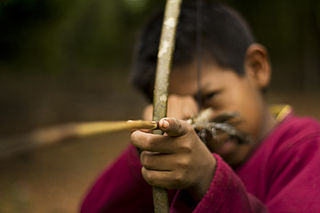
The Guarani are a group of culturally-related indigenous peoples of South America. They are distinguished from the related Tupi by their use of the Guarani language. The traditional range of the Guarani people is in what is now Paraguay between the Paraná River and lower Paraguay River, the Misiones Province of Argentina, southern Brazil once as far east as Rio de Janeiro, and parts of Uruguay and Bolivia.
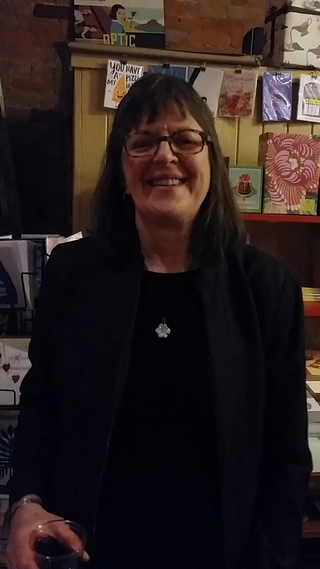
Erín Moure is a Canadian poet and translator with 18 books of poetry, a coauthored book of poetry, a volume of essays, a book of articles on translation, a poetics, and two memoirs.
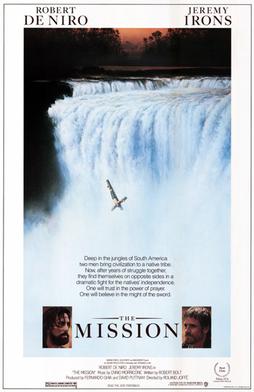
The Mission is a 1986 British period drama film about the experiences of a Jesuit missionary in 18th-century South America. Directed by Roland Joffé and written by Robert Bolt, the film stars Robert De Niro, Jeremy Irons, Ray McAnally, Aidan Quinn, Cherie Lunghi, and Liam Neeson.
Susy is a feminine given name, sometimes a short form (hypocorism) of Susan, Susanne, Susannah, etc.

Augusto Roa Bastos was a Paraguayan novelist and short story writer. As a teenager he fought in the Chaco War between Paraguay and Bolivia, and he later worked as a journalist, screenwriter and professor. He is best known for his complex novel Yo el Supremo and for winning the Premio Miguel de Cervantes in 1989, Spanish literature's most prestigious prize. Yo el Supremo explores the dictations and inner thoughts of José Gaspar Rodríguez de Francia, the eccentric dictator of Paraguay who ruled with an iron fist, from 1814 until his death in 1840.

Jopara or Yopará is a colloquial form of Guarani spoken in Paraguay which uses a number of Spanish loan words. Its name is from the Guarani word for "mixture".
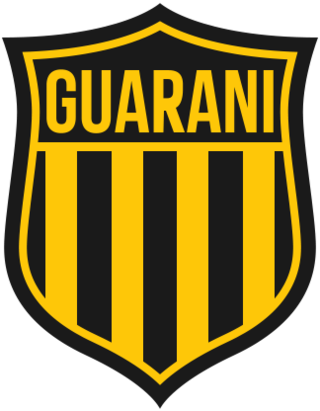
Club Guaraní is a Paraguayan football team, based in the neighbourhood of Pinozá in outer Asunción. Founded on 12 October 1903, it is one of the oldest and one of the most successful in the country, with eleven Primera División titles, and has never been relegated to a lower division.
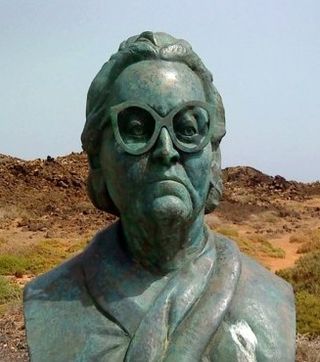
María Josefina Teodora Plá Guerra Galvany was a Spanish-born poet, playwright, journalist, art critic, sculptor, ceramicist, and historian. She has been described as "the most influential woman in Paraguayan cultural matters in the twentieth century."
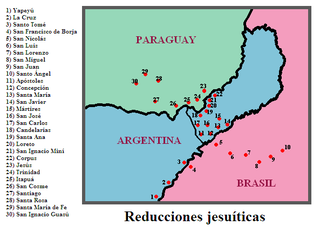
The Guaraní War of 1756, also called the War of the Seven Reductions, took place between the Guaraní tribes of seven Jesuit Missions and joint Spanish-Portuguese forces. It was a result of the 1750 Treaty of Madrid, which set a line of demarcation between Spanish and Portuguese colonial territory in South America.
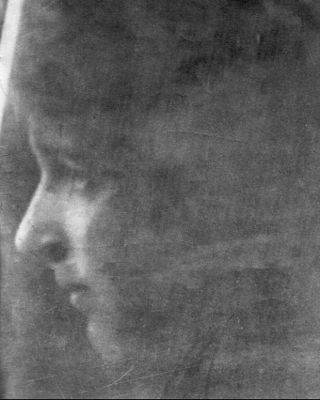
María Zambrano Alarcón was a Spanish essayist and philosopher associated with the Generation of '36 movement. Her extensive work between the civic engagement and the poetic reflection started to be recognised in Spain over the last quarter of the 20th century after living many years in exile. She was awarded the Prince of Asturias Award (1981) and the Miguel de Cervantes Prize (1988).
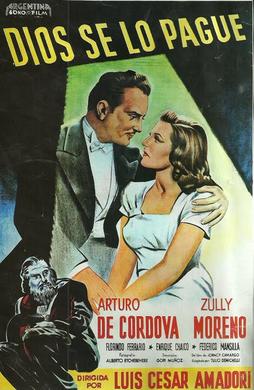
God Reward You is a 1948 Argentine drama film directed by Luis César Amadori and starring Arturo de Córdova and Zully Moreno. It won the Silver Condor Award for Best Film, given by the Argentine Film Critics Association in 1949 for the best picture of the previous year.

Emiliano FernándezRivarola was a Paraguayan poet, musician, and soldier. He is the author of more than 2,000 poems and participated in the Chaco War as an infantryman.

Gladys Carmagnola (1939–2015) was a Paraguayan poet and teacher. She is one of the country's best known writers; her work is devoted to a wide audience, including works for children and adults.
Raquel Chaves is a Paraguayan poet, journalist, novelist, and educator.

The OTI Festival 1978 was the seventh edition of the annual OTI Festival. It was held in Santiago, Chile, who offered to stage the event after Nicaragua, who won the previous contest, was unable to organize it due the outbreak of the Nicaraguan Revolution. Organised by the Organización de Televisión Iberoamericana (OTI) and host broadcasters Televisión Nacional de Chile (TVN), Canal 13, UCV Televisión and Canal 9, the contest was held at the Municipal Theatre of Santiago on Saturday 2 December 1978 and was hosted by Raúl Matas and Raquel Argandoña. Matas had previously presented the inaugural OTI Festival back in 1972 in Madrid.

Juliana, better known as the India Juliana, is the Christian name of a Guaraní woman who lived in the newly founded Asunción, in early-colonial Paraguay, known for killing a Spanish colonist between 1539 and 1542. She was one of the many indigenous women who were handed over to or stolen by the Spanish, forced to work for them and bear children. Since the area was not rich in minerals as they had anticipated, colonists generated wealth through the forced labor of indigenous people—especially the sexual exploitation of women of childbearing age.
The National Prize for Literature is awarded biennially, in odd-numbered years, by the Ministry of Education and Science, to "books in the genres of poetry, narrative, essay, or theater, written in Spanish or Guaraní, by Paraguayan or foreign authors with at least five years of residence in Paraguay." It was established in 1990 by Law No. 97/90, which also created the National Prize for Science, awarded in even-numbered years. This was updated by Law No. 1149 in 1997.
Maybell Lebron is an Argentine-born writer of short stories, poems, and novels, based in Paraguay. She is the founder of Associated Paraguayan Writers, and has won Paraguay's National Prize for Literature.
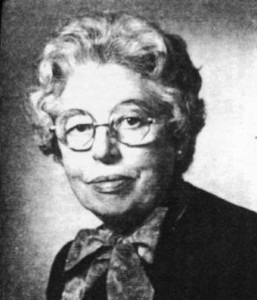
María Concepción Zardoya González, also known as Concha Zardoya, was a Chilean poet and literary critic. During her career, she published nearly 40 poetry collections and won multiple literary awards.